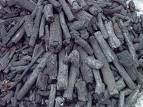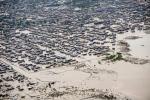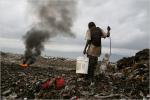Deforestation
USAID Launches Three Year Project to Support Clean Cooking Solutions
 The U.S. Agency for International Development (USAID) announced this week that it is providing seven million dollars to Chemonics for a three year project to promote the use of Liquefied Petroleum Gas (LPG) and improve access to improved cook-stoves. Haiti's dependence on wood-based fuels for cooking has negatively affected the environment, agriculture, and health. If combined with economic development and national reforestation efforts, projects like this could help slow environmental degradation in Haiti.
The U.S. Agency for International Development (USAID) announced this week that it is providing seven million dollars to Chemonics for a three year project to promote the use of Liquefied Petroleum Gas (LPG) and improve access to improved cook-stoves. Haiti's dependence on wood-based fuels for cooking has negatively affected the environment, agriculture, and health. If combined with economic development and national reforestation efforts, projects like this could help slow environmental degradation in Haiti.
A Rapid Assessment of Cooking Fuel Needs in Post Quake Haiti
 It is no secret that the environmental degradation caused by Haiti's over-reliance on wood fuels negatively impacts the country's ability to feed itself, to prevent disasters, and to protect the health and nutritional status of its children. After the earthquake, many people are now finding themselves more reliant than ever on wood charcoal, while having less money with which to pay for it. Securing access to alternative, inexpensive fuel sources is key to Haiti's future. Yet no one agency owns this issue. To address the need for increased attention, resources, and coordination, the Women's Refugee Commission and the World Food Program carried out a joint assessment of cooking needs in post earthquake Haiti, attached and copied below.
It is no secret that the environmental degradation caused by Haiti's over-reliance on wood fuels negatively impacts the country's ability to feed itself, to prevent disasters, and to protect the health and nutritional status of its children. After the earthquake, many people are now finding themselves more reliant than ever on wood charcoal, while having less money with which to pay for it. Securing access to alternative, inexpensive fuel sources is key to Haiti's future. Yet no one agency owns this issue. To address the need for increased attention, resources, and coordination, the Women's Refugee Commission and the World Food Program carried out a joint assessment of cooking needs in post earthquake Haiti, attached and copied below.
Saving Haiti's Environment, Preventing Instability and Conflict
 Many papers, books, and presentations have covered in great detail how Haiti came to be deforested. Fewer have focused on what Haitian government and civil society should do, with the support of the international community, to reverse the environmental destruction. Doing so is neccesary for food security, disaster prevention, nutrition and public health, social/economic stability, and ultimately security. The attached report by the International Crisis Group lists concrete actions that could be taken in the short and long term to promote security through rehabilitating the environment.
Many papers, books, and presentations have covered in great detail how Haiti came to be deforested. Fewer have focused on what Haitian government and civil society should do, with the support of the international community, to reverse the environmental destruction. Doing so is neccesary for food security, disaster prevention, nutrition and public health, social/economic stability, and ultimately security. The attached report by the International Crisis Group lists concrete actions that could be taken in the short and long term to promote security through rehabilitating the environment.
Secretary Clinton's Remarks at the Haiti Donors' Conference
 Below are remarks made by Secretary of State Hillary Clinton at the Haiti Donors' Conference today. While the United States provides in kind contributions of food, she notes that this is not the answer to Haiti's hunger. She instead emphasizes the importance of environmental rehabilitation, agriculture, livelihoods, and infrastructure. She also highlights the potential of alternative energy. After the conclusion of the conference, Secretary Clinton will visit Haiti en route to the Summit of the Americas.
Below are remarks made by Secretary of State Hillary Clinton at the Haiti Donors' Conference today. While the United States provides in kind contributions of food, she notes that this is not the answer to Haiti's hunger. She instead emphasizes the importance of environmental rehabilitation, agriculture, livelihoods, and infrastructure. She also highlights the potential of alternative energy. After the conclusion of the conference, Secretary Clinton will visit Haiti en route to the Summit of the Americas.
Overflowing Lake a Threat to Haiti
 An interesting Miami Herald article circulated last week concerning Lake Azuei, the largest in the country and a source of livelihoods for many. The lake’s waters have been rising for two years as a result of clogged drainage canals and deforested mountains that are no longer capable of absorbing rainfall. If Haitian authorities do not demonstrate leadership in addressing the country’s environmental challenges, of which this is one, the end result will be yet more disrupted lives, livelihoods, and communities. From Gonaives to Lake Azuei to the slums of Port au Prince full of Haitians from the countryside who have given up on agriculture, the need for better environmental management is clear.
An interesting Miami Herald article circulated last week concerning Lake Azuei, the largest in the country and a source of livelihoods for many. The lake’s waters have been rising for two years as a result of clogged drainage canals and deforested mountains that are no longer capable of absorbing rainfall. If Haitian authorities do not demonstrate leadership in addressing the country’s environmental challenges, of which this is one, the end result will be yet more disrupted lives, livelihoods, and communities. From Gonaives to Lake Azuei to the slums of Port au Prince full of Haitians from the countryside who have given up on agriculture, the need for better environmental management is clear.
What Next for Gonaives?
 The devastation to Gonaives brought with it a sense of déjà vu for Haiti watchers. We’ve been here before - the damage from Tropical Storm Jeanne was massive. Then as now, there were serious humanitarian needs that donors, non-governmental, and international organizations struggled mightily to meet. Then as now, there were a steady flow of politicians and celebrities. Other disasters happened elsewhere and Haiti again fell of the radar. The long term steps needed to ensure the survival of the city were not taken. Will things be different this time or will a preventable tragedy happen yet again?
The devastation to Gonaives brought with it a sense of déjà vu for Haiti watchers. We’ve been here before - the damage from Tropical Storm Jeanne was massive. Then as now, there were serious humanitarian needs that donors, non-governmental, and international organizations struggled mightily to meet. Then as now, there were a steady flow of politicians and celebrities. Other disasters happened elsewhere and Haiti again fell of the radar. The long term steps needed to ensure the survival of the city were not taken. Will things be different this time or will a preventable tragedy happen yet again?
Trash or Treasure? Turning Waste to Energy in Haiti
 Haiti is a beautiful country but it would certainly be more so if there were a functional waste management system. What if waste, rather than winding up in the street, ocean, or a landfill could be converted into energy? Port au Prince would become a very clean city in short order. The New York Times carried an article stating that virtually any material containing hydrogen, carbon and oxygen could potentially be converted into fuel. This include plastics, construction debris, forest and lawn trimmings, wood chips, wheat straw, and agricultural waste. This approach could someday help Haiti meet its energy needs without being at the mercy of oil.
Haiti is a beautiful country but it would certainly be more so if there were a functional waste management system. What if waste, rather than winding up in the street, ocean, or a landfill could be converted into energy? Port au Prince would become a very clean city in short order. The New York Times carried an article stating that virtually any material containing hydrogen, carbon and oxygen could potentially be converted into fuel. This include plastics, construction debris, forest and lawn trimmings, wood chips, wheat straw, and agricultural waste. This approach could someday help Haiti meet its energy needs without being at the mercy of oil.
